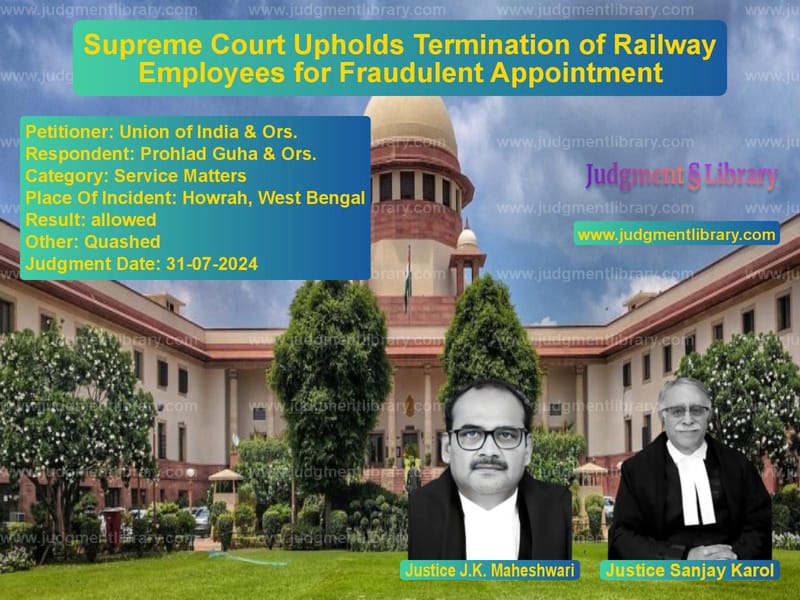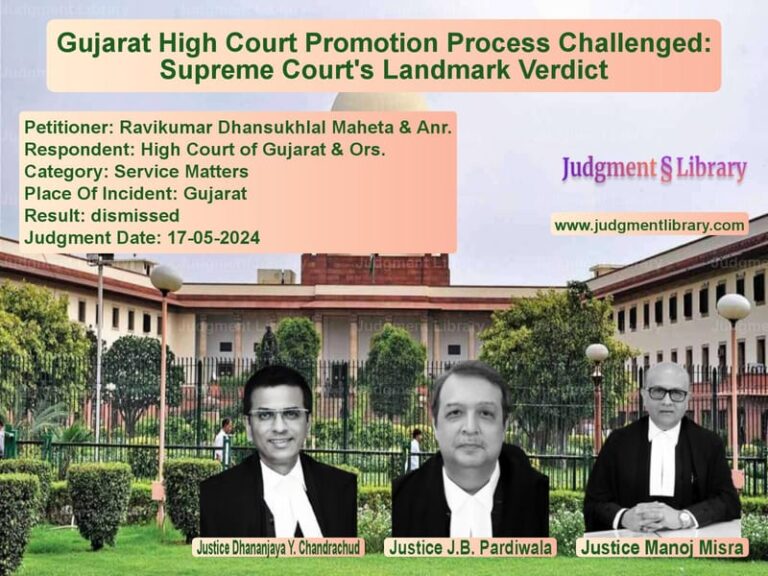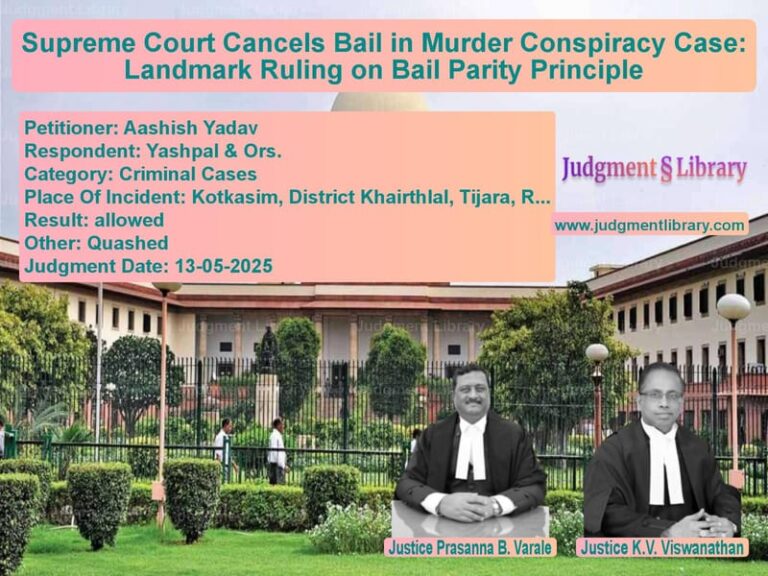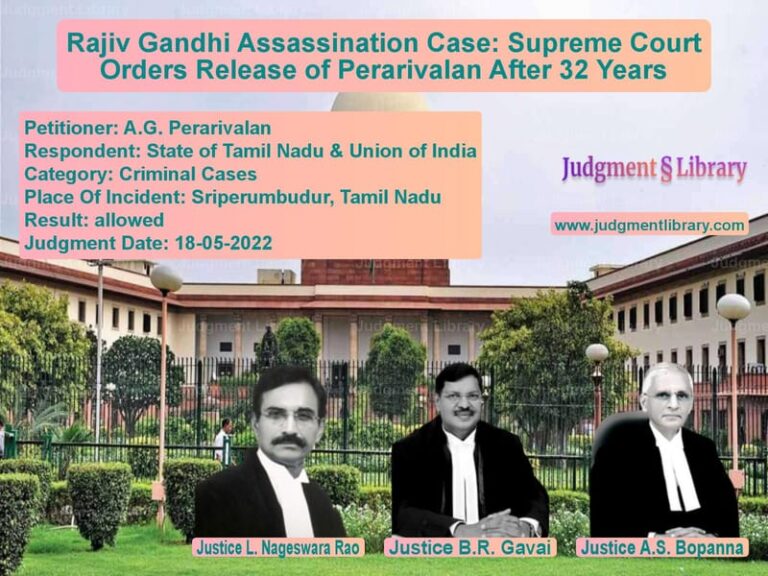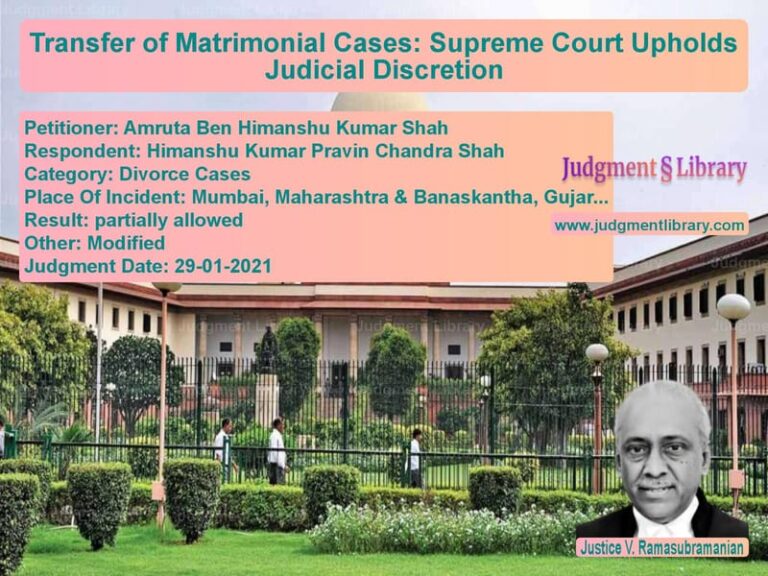Supreme Court Upholds Termination of Railway Employees for Fraudulent Appointment
The case of Union of India & Ors. v. Prohlad Guha & Ors. pertains to the fraudulent appointment of railway employees on compassionate grounds based on forged and fabricated documents. The Supreme Court was tasked with determining whether the termination of these employees was legally sustainable. In its ruling, the Court upheld the dismissal, emphasizing that appointments obtained through fraud are void ab initio and do not warrant protection under Article 311 of the Constitution.
The dispute originated when multiple railway employees were found to have secured jobs on compassionate grounds by submitting falsified documents regarding the employment status of their deceased fathers. Following an inquiry, the railway authorities terminated their services. The employees challenged this action before the Central Administrative Tribunal (CAT), which dismissed their pleas. However, the Calcutta High Court later reversed the tribunal’s decision and ordered reinstatement. The Supreme Court, in its final verdict, quashed the High Court’s ruling and reinstated the termination orders.
Background of the Case
Facts Leading to the Dispute
- The respondents were appointed in the Engineering Department, Howrah Division, Eastern Railway, on compassionate grounds.
- Upon verification, it was discovered that the employment records of their deceased fathers were forged, and their appointments were based on fraudulent documents.
- In 2005, the disciplinary authority suspended them, pending an inquiry.
- Show-cause notices were issued, asking them to explain why their appointments should not be terminated.
- After reviewing their responses, the disciplinary authority terminated their services.
- They filed appeals, which were dismissed by the appellate authority.
- Subsequently, they challenged their dismissal before the Central Administrative Tribunal, which upheld the termination.
- The respondents then approached the Calcutta High Court, which ruled in their favor and directed reinstatement.
- The Union of India challenged the High Court’s ruling before the Supreme Court.
Legal Issues Raised
Appellants’ Arguments
The Union of India and Eastern Railway contended that:
- The respondents had fraudulently secured their appointments by submitting forged and fabricated documents.
- Appointments obtained through fraudulent means are void ab initio and do not require a disciplinary inquiry under Article 311.
- The High Court erred in reinstating the respondents, as they were never legally appointed.
- The CAT correctly upheld the termination, recognizing that fraud vitiates all proceedings.
- The employees were not entitled to protection under the Discipline & Appeals Rules since their very appointment was illegal.
Respondents’ Arguments
The dismissed employees argued that:
- The railway authorities did not conduct a full-fledged inquiry before terminating them.
- They were not given a fair opportunity to defend themselves.
- Some of them were unaware of the alleged fraud and had no role in fabricating documents.
- Their long service record should be considered, and they should be given an opportunity to continue employment.
Supreme Court’s Observations
On the Fraudulent Nature of Appointments
The Supreme Court emphasized that:
- Compassionate appointments are an exception to the rule of open competition and must be strictly regulated.
- When appointments are obtained through fraudulent means, they are void from inception and confer no legal rights.
- Article 311 protections apply only to legally appointed employees, which the respondents were not.
- Fraud vitiates all transactions, including public employment, and cannot be condoned.
On the Lack of a Full-Fledged Inquiry
The Court rejected the respondents’ argument regarding the absence of a formal inquiry, stating:
- Since the appointments were obtained through fraud, there was no need for a disciplinary inquiry.
- Once it was established that the documents were forged, the appointments automatically became null and void.
- The respondents had been given an opportunity to respond to the show-cause notices, which fulfilled the requirements of natural justice.
Legal Precedents Considered
The Court referred to several landmark judgments, including:
- Union of India v. M. Bhaskaran (1995) – Held that fraud in securing public employment renders the appointment void.
- State of Haryana v. Ram Kumar (2020) – Reaffirmed that appointments secured through fraudulent means do not require a disciplinary inquiry.
- Bihar Public Service Commission v. State of Bihar (2023) – Held that candidates found guilty of submitting forged documents must be removed from service immediately.
Final Judgment
The Supreme Court ruled that:
- The Calcutta High Court’s order reinstating the respondents was erroneous and was set aside.
- The termination orders issued by the railway authorities were upheld.
- The respondents had no right to continue in service as their appointments were fraudulent.
- Their claims for back wages and reinstatement were dismissed.
This ruling reinforces the principle that government appointments secured through fraudulent means are void ab initio. It upholds the integrity of public employment and ensures that compassionate appointments remain reserved for genuine cases.
Petitioner Name: Union of India & Ors..Respondent Name: Prohlad Guha & Ors..Judgment By: Justice J.K. Maheshwari, Justice Sanjay Karol.Place Of Incident: Howrah, West Bengal.Judgment Date: 31-07-2024.
Don’t miss out on the full details! Download the complete judgment in PDF format below and gain valuable insights instantly!
Download Judgment: union-of-india-&-ors-vs-prohlad-guha-&-ors.-supreme-court-of-india-judgment-dated-31-07-2024.pdf
Directly Download Judgment: Directly download this Judgment
See all petitions in Disciplinary Proceedings
See all petitions in Public Sector Employees
See all petitions in Termination Cases
See all petitions in Judgment by J.K. Maheshwari
See all petitions in Judgment by Sanjay Karol
See all petitions in allowed
See all petitions in Quashed
See all petitions in supreme court of India judgments July 2024
See all petitions in 2024 judgments
See all posts in Service Matters Category
See all allowed petitions in Service Matters Category
See all Dismissed petitions in Service Matters Category
See all partially allowed petitions in Service Matters Category

